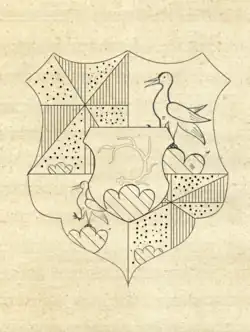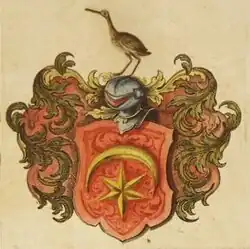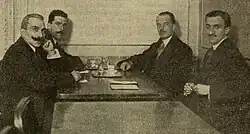Rietmann (family)
| Rietmann | |
|---|---|
| Country | Switzerland |
| Founded | XIII |
| Founder | Burkard Rietmann |
| Cadet branches |
|
The House of Rietmann is an ancient Swiss family, with its earliest records dating back to the 13th century and most likely originating in Bischofszell, in the Canton of Thurgau. Over the centuries, its various branches established themselves in numerous Swiss cities—including Zurich, St. Gallen, Schaffhausen, and Basel—producing merchants, soldiers, public officials, and prominent figures within the civic guilds. From the 19th century onwards, some members emigrated beyond Switzerland’s borders, settling in centers such as Milan and even venturing as far as New Zealand.[1][2][3][4][5]
Origins
Although the family’s naturalization in Bischofszell is documented as early as 1417, the first reliable reference dates to 1296, when a Burkard Rietmann appears in the registers of Zurich. Between the 14th and 15th centuries, several Rietmanns are recorded in the area stretching from Bischofszell to Wattwil, bound by oaths to the Counts of Toggenburg. In the centuries that followed, members of the family relocated first to Zurich, Schaffhausen, and Basel, and later to St. Gallen, where the Rietmanns would achieve their greatest political and economic prominence.[1][2][3][5]
Branches
St. Gallen Branch
The branch destined to become the most influential was that of St. Gallen. Around 1420, the Rietmanns moved from Rorschach to the city-republic, where Hans Rietmann, formerly bailiff of Rorschach Castle, secured citizenship in 1499. A second branch from Bischofszell, known as Kudermann, was naturalized in 1538. Their entry into the Bürgerbuch granted them full participation in the guild-based governing bodies. From the 16th to the 18th century, numerous Rietmanns served as Zunftmeister (guild masters), particularly in the butchers’ guild (Zunft der Metzger) and the blacksmiths’ guild (Zunft der Schmiede). Through these offices, they gained seats in the Small Council (Kleiner Rat) and at times rose to the positions of Deputy Mayor (Unterbürgermeister) and Mayor (Bürgermeister).

Over fourteen generations, at least sixty-three members of the family are recorded as butchers, forty-five of them from the principal line, six of whom attained the rank of guild master. For nearly four centuries, the Rietmanns maintained a continuous presence in the political life of St. Gallen.[3][4]
Even before their naturalization in St. Gallen, several Rietmanns held property and ecclesiastical tithes in eastern Switzerland. In 1421, Üli Rietmann received lands and revenues in Nieder-Arnegg from the Abbot of St. Gallen. In 1440, Hans Rietmann is documented as owner of farms in Begginen, and in 1467, Hans and Üli Rietmann, sons of the late Üli, were granted estates and tithes in Nieder-Arnegg and Hüttenwil. In 1571, Heinrich and Ulrich Rietmann appear as co-owners of land in Lustnau. Such records attest to the family’s continuity and prominence in the region well before their official admission into St. Gallen’s citizenry in 1499.[6]
During the tense months leading up to the Second War of Kappel in June 1529, Heinrich Rietmann, known as Vogt, commanded a unit of 105 militiamen dispatched by the Council of St. Gallen to the Rhine frontier. Days later, he assumed command of a garrison of twenty-four men tasked with guarding the city abbey, marking the family’s early involvement in the military and political affairs of the guild republic.
Beyond their civic duties, many Rietmanns made their mark in other fields. Michael Rietmann (1647–1726) funded schools in St. Gallen; his grandson, also Michael (1782–1862), promoted the scientific management of communal forests; and Georg Karl Rietmann-Gruebler (1843–1899) served as vice-president of the Union Bank and was among the promoters of the Mühlegg funicular. In the cultural sphere, notable figures include pastor and writer Johann Jakob Rietmann-Brändli (1815–1867), drawing instructor Johann Jakob Blasius Rietmann-Zollikofer (1808–1868), and gymnast and goldsmith Jakob Arnold Rietmann (1846–1906), renowned nationwide for his exercise series. Others within the family became successful innkeepers and hoteliers.
In the 19th century, several branches established themselves abroad: merchants founded offices in Galați (Romania), others settled in Milan, while explorers such as Otmar Laurenz Rietmann (1831–1869) journeyed as far as Australia and New Zealand. Despite this dispersion, the Rietmann name remains closely tied to the economic and political history of St. Gallen, where the family epitomized the transformation from an artisan elite to an urban patriciate in a city without a native nobility.[4][3]
From the line that settled in Milan descended Hugo Eugen Rietmann, a textile entrepreneur and prominent figure in the early days of Italian football. Having moved to the Lombard capital in his youth and naturalized as Italian in 1920, he took part on 9 March 1908 in the meeting at the Ristorante L’Orologio that led to the founding of the Foot-Ball Club Internazionale, where he also played as a midfielder during the 1909 season. After his playing career, he became a federal referee; in 1927 he contributed to the establishment of the Milanese section of the Italian Referees’ Association (A.I.A.), with which he remained involved as an official for three decades. At the same time, he managed a high-quality textile business, maintaining trade ties with Switzerland and helping introduce St. Gallen textile techniques into Lombardy’s industry. In 1948, the FIGC awarded him the title of “Pioneer of Italian Football.”[7][3]
Schaffhausen Branch

The Rietmanns are recorded in Schaffhausen as early as 1392, when the family appears in the city’s first tax register. In 1575, a member formally obtained Burgerrecht (citizenship rights), securing their place within the Schaffhausen urban patriciate. Among its notable figures was Johannes Rietmann, who pursued a military career that culminated in his appointment as field marshal in the service of the House of Savoy.[8][9]
Zurich Branch
The Zurich branch originated through naturalization from Bischofszell between 1422 and 1434, joining the artisan-merchant class of the Böcken. This line became extinct on March 28, 1723.[10]
Relations and Marriages
Over the centuries, the Rietmann family of St. Gallen established ties with numerous prominent houses, consolidating social and political relations between Switzerland and Italy.
- Huber – an ancient St. Gallen lineage, documented since the 14th century. Notable members include Uli Huber, who fell at Marignano (1515), and Ferdinand Fürchtegott Huber (1791–1863), a composer of great popularity in Switzerland. The family included burgomasters, clergymen, military officers, and key figures in the city’s cultural life.[11]
- Scheitlin – a bourgeois family rooted in St. Gallen since the 16th century. It distinguished itself through prominent religious and academic figures, such as Peter Scheitlin (1779–1848), pastor and professor of philosophy and natural sciences, regarded as a reformer of St. Gallen’s cultural and social life.[3]
- Högger – a family of Appenzell origin, known for the Höggersberg branch. In the 17th and 18th centuries, some members obtained noble titles in France and Sweden, founded banks, and held high diplomatic and military offices, also distinguishing themselves in St. Gallen’s political life.[12]
- Locher – attested in St. Gallen as early as the 14th century, the family prospered through trade and allied with prestigious houses such as the Högger. Some descendants founded charitable institutions, while others held prominent political, military, and religious offices.[3]
- Bonzi – a noble Lombard family, Counts of the Serio of Crema, with whom the Rietmann established ties in modern times, thus reinforcing connections with the Italian nobility.[13]
Other marriages connected the Rietmann with families such as Wild, Tobler, Wettach, Alther, Rheiner, Scherrer, Dürrler, Ehrenzeller, Schlegel, and Fehr, further expanding the network of relations of the house.[3]
Notable Members
.jpg)
- Heinrich Rietmann (†1509): took part in the Swiss mercenary expedition to Naples in 1495, surviving as one of only four survivors among the 121 men from St. Gallen who set out.[5]
- Michael Rietmann (1647–1726): a wealthy merchant and city councilor; he supported the schools of St. Gallen and served as treasurer.[5]
- Johannes Rietmann (1679–1765): fought in the service of the Netherlands (1696–1703) and later of Piedmont (1703–1743), rising to the rank of field marshal by royal decree, thereby attaining the rank of general. He took part in the War of the Spanish Succession, the War of the Polish Succession, and the War of the Austrian Succession. In 1734, he was ennobled by the King of Sardinia.[14][5][8]
- Hans Jacob Rietmann (1667–1756): served the city of St. Gallen as master of the weavers' guild, captain in the garrison troops, head of the Merchants' College, hospital administrator, deputy mayor (1725–1729), triennial mayor (1729–1756), and imperial judicial officer. He became mayor during a period of reform, during which he ordered the reorganization of the city's school oversight.[5]
- Johannes Rietmann (“Trisch”) and his son Zacharias (†1830): gave their name to the inn and reading society “zum Trischli” in St. Gallen.[5]
- J. J. Rietmann-Brändli (1815–1867): Protestant pastor, active mainly in Lichtensteig, known for his originality of thought and literary vitality.[5]
- Georg Karl Rietmann-Gruebler (1843–1899): a highly capable entrepreneur, built his fortune in Galați, Romania, before returning to St. Gallen, where he held leadership positions in banking and commercial institutions.[5]
- Michael Rietmann (1782–1862): made decisive contributions to the sustainable use of St. Gallen’s municipal forests; he served as forest administrator from 1819 to 1850 and remained on the forestry commission until his death.[5]
- Hans Kaspar Rietmann (1717–1777): military chaplain in the French army with the Diesbach regiment, later a French language teacher at the St. Gallen gymnasium, and then pastor of the French Church (1767–1775).[5]
- Hugo Eugen Rietmann (1886–1959): was a textile entrepreneur, footballer (one of the founders of Inter Milan), football referee (founder of the A.I.A.), and a Swiss-Italian naturalized coach, who played as a midfielder.[5][7]

References
- ^ a b "Digitaler Lesesaal - Digitaler Lesesaal". dls.staatsarchiv.sg.ch. Retrieved 2025-04-26.
- ^ a b "Stiftsbezirk St. Gallen - Stiftsbezirk St.Gallen". www.stiftsbezirk.ch. Retrieved 2025-04-26.
- ^ a b c d e f g h St. Gallen (1910). Bürgerbuch der Stadt St. Gallen 1910. St. Gallen: Verlag der Fehr´schen Buchhandlung.
- ^ a b c "Rietmann". hls-dhs-dss.ch (in Italian). Retrieved 2025-03-21.
- ^ a b c d e f g h i j k l Sankt Gallen (1901). Bürgerbuch der Ortsbürgergemeinde St. Gallen 1900. Sankt Gallen: Verlag der Fehr´schen Buchhandlung.
- ^ Johannes, Göldi (1897). Der Hof Bernang.
- ^ a b "Hugo Eugenio Rietmann". www.magliarossonera.it. Retrieved 2025-03-22.
- ^ a b "Rietmann, Johannes". hls-dhs-dss.ch (in Italian). Retrieved 2025-03-22.
- ^ Schaffhausen, KSD. "Stadtarchiv Schaffhausen : Bürgerbuch der Stadt Schaffhausen (1392-1830)". www.stadtarchiv-schaffhausen.ch (in German). Archived from the original on 2025-05-24. Retrieved 2025-06-26.
- ^ "Stammlinie Rietmann".
- ^ "Huber (SG)". hls-dhs-dss.ch (in Italian). Retrieved 2025-08-04.
- ^ "Högger". hls-dhs-dss.ch (in German). Retrieved 2025-08-04.
- ^ Bonzi, Ercole (1946). I Conti del Serio. Memorie familiari dei Conti Bonzi fu Giuseppe, a cura del Conte Enzo Bonzi. La Moderna.
- ^ Wipf, H. U. (1979). Johannes Rietmann (1679-1765), General in sardinischen Diensten. Schaffhauser Mappe.